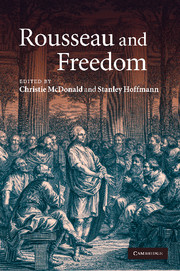Book contents
- Frontmatter
- Contents
- List of illustrations
- Notes on contributors
- Acknowledgments
- List of abbreviations
- Introduction
- PART I
- PART II
- 7 The Social Contract, or the mirage of the general will
- 8 “Par le bon usage de ma liberté”: freedom and Rousseau's reconstituted Christianity
- 9 The constraints of liberty at the scene of instruction
- 10 “Toutes mes idées sont en images”: Rousseau and the yoke of necessity
- 11 Rousseau's ruins
- 12 Can woman be free?
- 13 The subject and its body: love of oneself and freedom in the thought of Rousseau
- PART III
- Bibliography
- Index
9 - The constraints of liberty at the scene of instruction
Published online by Cambridge University Press: 05 May 2010
- Frontmatter
- Contents
- List of illustrations
- Notes on contributors
- Acknowledgments
- List of abbreviations
- Introduction
- PART I
- PART II
- 7 The Social Contract, or the mirage of the general will
- 8 “Par le bon usage de ma liberté”: freedom and Rousseau's reconstituted Christianity
- 9 The constraints of liberty at the scene of instruction
- 10 “Toutes mes idées sont en images”: Rousseau and the yoke of necessity
- 11 Rousseau's ruins
- 12 Can woman be free?
- 13 The subject and its body: love of oneself and freedom in the thought of Rousseau
- PART III
- Bibliography
- Index
Summary
The wise man knows how to stay in his place; but the child, who does not know his place, would not be able to keep to it. Among us he is given a thousand exits by which to leave it. It is for those who govern him to keep him in his place, and this is not an easy task.
Jean-Jacques Rousseau, Emile or On EducationWhat did Rousseau see without seeing it, what did he know without being able to express it, what could he not know from within the assumptions he was making?
Irene E. Harvey, Labyrinths of ExemplarityEmile, ou de l'éducation (1762) constructs a singular scene of instruction where a curious mix of artifice and nature, liberty and confinement, dissimulation and transparency, creates the conditions for the elaborate project that is the education of Rousseau's fictional student, Emile. The conceit of Emile's education is that there is no space that is not pedagogical. The whole of his existence is a heuristic stage, with its boundaries drawn and enforced by his gouverneur, Jean-Jacques, who is at once Emile's fictional tutor and also the self-proclaimed “visionary on education” who authors the text for the benefit of other would-be educators. Addressing a tutor's responsibility to monitor the scene of instruction with vigilance, Jean-Jacques compares Emile to a sleepwalker blissfully ambling along the edge of a cliff. If the sleepwalker were to awaken suddenly, we are told, he would surely fall:
As a somnambulist, wandering during his slumber, sleepwalks on the brink of a precipice into which he would fall if he were suddenly awakened, so my Emile, in the slumber of ignorance, escapes perils that he does not perceive. […]
Information
- Type
- Chapter
- Information
- Rousseau and Freedom , pp. 159 - 173Publisher: Cambridge University PressPrint publication year: 2010
Accessibility standard: Unknown
Why this information is here
This section outlines the accessibility features of this content - including support for screen readers, full keyboard navigation and high-contrast display options. This may not be relevant for you.Accessibility Information
- 2
- Cited by
